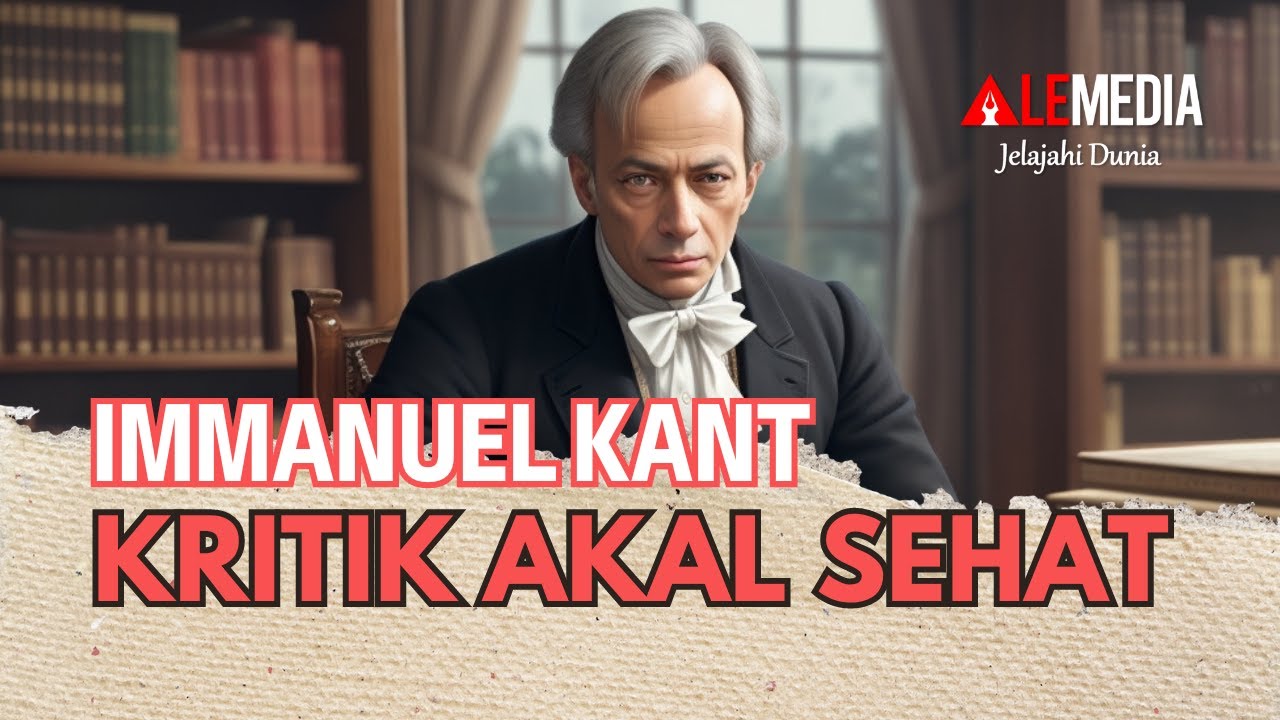PHILOSOPHY Immanuel Kant
Summary
TLDRImmanuel Kant, born in 1724, was a philosopher who sought to establish a secular foundation for ethical behavior through reason. Despite his modest upbringing and personal life, Kant's ideas, such as the categorical imperative, aimed to replace religious authority with rational thought. His philosophy extended to politics, advocating for a government that promotes reason and liberty, and to aesthetics, where he saw beauty and art as reminders of our universal nature and ethical ideals.
Takeaways
- 📚 Immanuel Kant was a philosopher focused on how humans could be good and kind without relying on traditional religious exhortations.
- 🏰 Born in 1724 in Königsberg, Kant's modest background and life of simplicity contrasted with his intellectual pursuits.
- 💼 Kant's financial situation improved only in his 50s when he became a fully salaried professor, achieving moderate prosperity.
- 🙏 Despite not holding conventional religious beliefs, Kant recognized the social utility of religion in fostering community and cohesion.
- 🎉 Kant was sociable and enjoyed social gatherings, even setting rules for conversation during his dinner parties to ensure a good mood.
- 📜 Kant's writings, especially the 'Critique of Judgment' and 'Groundwork of the Metaphysics of Morals,' reflect his thoughts on ethics and aesthetics.
- 🔄 Kant's 'categorical imperative' is a key concept, urging individuals to act according to maxims that could be universally accepted as laws.
- 👥 The 'categorical imperative' also emphasizes treating people as ends in themselves, not merely as means, a shift from Christian universal love.
- 🏛 In politics, Kant believed in the importance of liberty, but defined it not as the absence of government, but as acting in accordance with one's best nature.
- 🎨 Kant's work on beauty and art is integral to his philosophy, suggesting that art serves as a reminder of our better selves and universal being.
- 🌟 Kant aimed to develop a secular, rational approach to ethics, akin to what religions attempted but imperfectly achieved—to help people be good.
Q & A
Who was Immanuel Kant and what was his main philosophical focus?
-Immanuel Kant was an 18th-century philosopher who focused on how human beings could be good and kind outside of traditional religious influences. He sought to replace religious authority with the authority of reason, or human intelligence.
Where and when was Immanuel Kant born?
-Immanuel Kant was born in 1724 in the Baltic city of Königsberg, which was part of Prussia at the time and is now known as Kaliningrad, belonging to Russia.
What was Kant's family background like?
-Kant came from a modest family. His father was a saddle maker, and they were deeply religious and strict, which influenced Kant's early life and later philosophical views on religion.
How did Kant's financial situation change throughout his life?
-Kant never had much money and lived modestly. It wasn't until his 50s that he became a fully salaried professor and attained a moderate degree of prosperity.
What was Kant's view on the role of religion in society?
-Although Kant did not hold conventional religious beliefs later in life, he recognized the usefulness of religion in fostering social cohesion and community, and in helping people cope with hardships.
How did Kant's physical appearance and lifestyle contrast with his sociability?
-Despite being physically slight and frail, Kant was very sociable and enjoyed attending parties, which some of his colleagues criticized as excessive.
What was the significance of the Enlightenment period in Kant's work?
-Kant was writing during the Enlightenment, a period of intellectual growth and secularism. He welcomed the decline in belief in Christianity but was also alarmed by it, leading him to propose the use of reason over religious authority.
What is the categorical imperative and how does it relate to moral actions?
-The categorical imperative is a moral principle formulated by Kant, stating 'Act only according to that maxim by which you can at the same time will that it should become a universal law.' It is a way to test the morality of an action by imagining its universal practice and its impact if everyone were to be a victim of it.
How did Kant's categorical imperative relate to the concept of treating people as ends in themselves?
-Kant argued that the core idea of the categorical imperative could be restated as 'Act so as to treat people always as ends in themselves, never as mere means.' This principle emphasizes respecting individuals' autonomy and inherent worth, rather than using them for personal gain.
What was Kant's view on the role of government in relation to freedom?
-Kant believed that the central duty of government is to ensure liberty, but not in the libertarian sense of doing whatever one wants. Instead, freedom for Kant meant acting in accordance with one's best nature and being free from the rule of passions, with the good state representing the rational element in all of us.
How did Kant's thoughts on beauty and art fit into his broader philosophical framework?
-Kant published 'Critique of Judgment' to explore beauty and art, viewing them as natural extensions of philosophy. He believed that art could embody ethical ideas and serve as a reminder of our common universal being, helping to strengthen the better parts of our nature.
Outlines

Esta sección está disponible solo para usuarios con suscripción. Por favor, mejora tu plan para acceder a esta parte.
Mejorar ahoraMindmap

Esta sección está disponible solo para usuarios con suscripción. Por favor, mejora tu plan para acceder a esta parte.
Mejorar ahoraKeywords

Esta sección está disponible solo para usuarios con suscripción. Por favor, mejora tu plan para acceder a esta parte.
Mejorar ahoraHighlights

Esta sección está disponible solo para usuarios con suscripción. Por favor, mejora tu plan para acceder a esta parte.
Mejorar ahoraTranscripts

Esta sección está disponible solo para usuarios con suscripción. Por favor, mejora tu plan para acceder a esta parte.
Mejorar ahoraVer Más Videos Relacionados
5.0 / 5 (0 votes)






